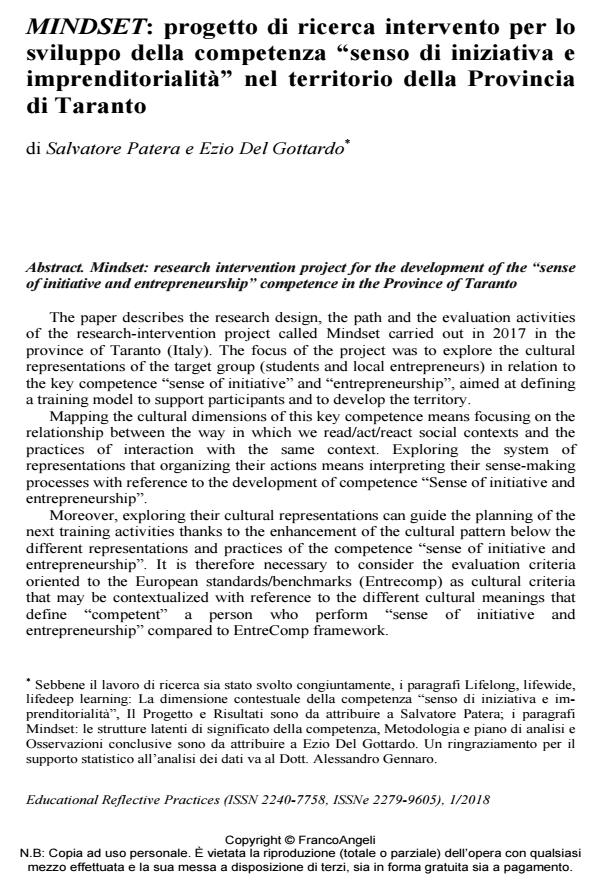MINDSET: progetto di ricerca intervento per lo sviluppo della competenza "senso di iniziativa e imprenditorialità" nel territorio della Provincia di Taranto
Titolo Rivista EDUCATIONAL REFLECTIVE PRACTICES
Autori/Curatori Salvatore Patera, Ezio Del Gottardo
Anno di pubblicazione 2018 Fascicolo 2018/1
Lingua Italiano Numero pagine 19 P. 179-197 Dimensione file 266 KB
DOI 10.3280/ERP2018-001011
Il DOI è il codice a barre della proprietà intellettuale: per saperne di più
clicca qui
Qui sotto puoi vedere in anteprima la prima pagina di questo articolo.
Se questo articolo ti interessa, lo puoi acquistare (e scaricare in formato pdf) seguendo le facili indicazioni per acquistare il download credit. Acquista Download Credits per scaricare questo Articolo in formato PDF

FrancoAngeli è membro della Publishers International Linking Association, Inc (PILA)associazione indipendente e non profit per facilitare (attraverso i servizi tecnologici implementati da CrossRef.org) l’accesso degli studiosi ai contenuti digitali nelle pubblicazioni professionali e scientifiche
The paper describes the research design, the path and the evaluation activities of the research-intervention project called Mindset carried out in 2017 in the province of Taranto (Italy). The focus of the project was to explore the cultural representations of the target group (students and local entrepreneurs) in relation to the key competence "sense of initiative" and "entrepreneurship", aimed at defining a training model to support participants and to develop the territory. Mapping the cultural dimensions of this key competence means focusing on the relationship between the way in which we read/act/react social contexts and the practices of interaction with the same context. Exploring the system of representations that organizing their actions means interpreting their sense-making processes with reference to the development of competence "Sense of initiative and entrepreneurship". Moreover, exploring their cultural representations can guide the planning of the next training activities thanks to the enhancement of the cultural pattern below the different representations and practices of the competence "sense of initiative and entrepreneurship". It is therefore necessary to consider the evaluation criteria oriented to the European standards/benchmarks (Entrecomp) as cultural criteria that may be contextualized with reference to the different cultural meanings that define "competent" a person who perform "sense of initiative and entrepreneurship" compared to EntreComp framework. The next research step will explore the presence and type of possible statistical link among the cultural representations and the performance assessment levels related to this competence and/or its components carried out in formal, informal and non-formal contexts.
Salvatore Patera, Ezio Del Gottardo, MINDSET: progetto di ricerca intervento per lo sviluppo della competenza "senso di iniziativa e imprenditorialità" nel territorio della Provincia di Taranto in "EDUCATIONAL REFLECTIVE PRACTICES" 1/2018, pp 179-197, DOI: 10.3280/ERP2018-001011